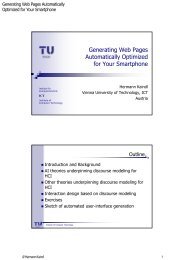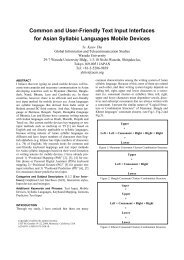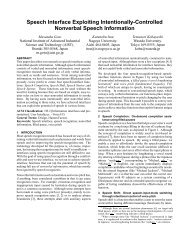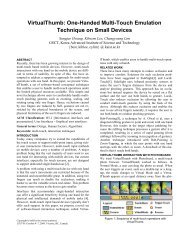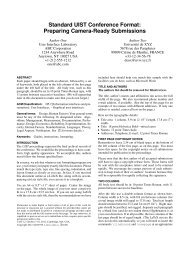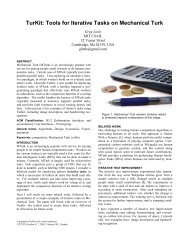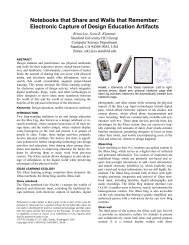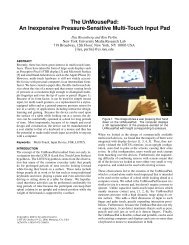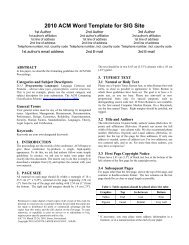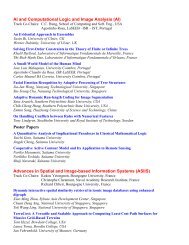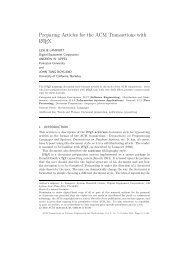API Design Matters Stonebraker and Seltzer - RabbitMQ
API Design Matters Stonebraker and Seltzer - RabbitMQ
API Design Matters Stonebraker and Seltzer - RabbitMQ
You also want an ePaper? Increase the reach of your titles
YUMPU automatically turns print PDFs into web optimized ePapers that Google loves.
One of the advantages of Linux is that when a fix is<br />
issued, it is very quick to install. Furthermore, unless it<br />
is in the kernel, your downtime for that service is on the<br />
order of seconds or minutes. Rarely, if ever, is a reboot<br />
necessary.<br />
SIN fOur: INSECURE ANd BAdlY CONfIgUREd<br />
PROgRAMS<br />
The use of insecure programs (such as PHP, FTP, rsh, NFS,<br />
<strong>and</strong> portmap) in other than carefully controlled situa-<br />
tions <strong>and</strong> failure to configure other programs properly<br />
continues to be a major security sin.<br />
Most sysadmins know that POP <strong>and</strong> IMAP (unless<br />
wrapped in SSL), telnet, <strong>and</strong> FTP 4 send passwords <strong>and</strong> data<br />
in the clear (unencrypted). They know that PHP, NFS,<br />
<strong>and</strong> portmap have a history of security problems, as well<br />
as design defects in their authentication. Many use them<br />
anyway, <strong>and</strong> then are surprised when they get broken<br />
into. Instead, use spop, simap, ssh, <strong>and</strong> ssh’s scp or sftp,<br />
or put a good firewall in front of that subnet, or set up a<br />
restricted VPN between your facilities. If you absolutely<br />
must use PHP, keep it patched <strong>and</strong> carefully audit your<br />
code for problems.<br />
Many programs are secure only if properly config-<br />
ured. It is common for sysadmins to configure them<br />
improperly, sometimes because of a lack of training <strong>and</strong><br />
underst<strong>and</strong>ing of the risks; other times use of an inse-<br />
cure feature is deliberate, because “I just gotta have it.” A<br />
recent case in point is Apache’s PHP capability, which has<br />
had a history of security problems. These problems have<br />
been well publicized, <strong>and</strong> still some people cannot seem<br />
to use it securely or find an alternative. Security <strong>and</strong> con-<br />
venience are often contradictory, <strong>and</strong> you have to make a<br />
choice between the two.<br />
Before deciding to deploy a service (or changing<br />
which capabilities will be used or how the service will be<br />
deployed), do some research. Check the security his-<br />
tory <strong>and</strong> underst<strong>and</strong> how the service may be deployed<br />
securely. If it cannot be deployed securely, what are<br />
secure alternatives? I still encounter people using FTP,<br />
not realizing that sftp is an excellent alternative. Putting<br />
an insecure service such as NFS behind a firewall may be<br />
the solution for some. For others, putting their insecure<br />
Windows networks behind firewalls, with their differ-<br />
ent offices linked via a VPN between these same Linux<br />
firewalls, offers excellent security. Configure a firewall<br />
with separate subnets on separate interfaces for different<br />
categories of users, such as students <strong>and</strong> faculty or sales,<br />
human resources, <strong>and</strong> engineering.<br />
Absolutely prohibit wireless networks inside of the<br />
more queue: www.acmqueue.com<br />
firewall or to any system with confidential information<br />
unless all wireless traffic first is encrypted with IPsec or<br />
equivalent. Do not rely on WEP (Wired Equivalent Pri-<br />
vacy) or its successors.<br />
Web servers <strong>and</strong> CGI programs are the bane of Linux<br />
<strong>and</strong> Unix computer security. Simply speaking, a CGI pro-<br />
gram is one of the easiest ways that a hacker can get into<br />
your system. It is essentially a program that runs on your<br />
computer at the request of anyone <strong>and</strong> everyone without<br />
passwords <strong>and</strong> has the access to do powerful things (for<br />
example, shipping valuable merch<strong>and</strong>ise, revealing confi-<br />
dential data such as your customers’ credit card numbers,<br />
<strong>and</strong> moving money between accounts).<br />
A CGI allows anyone to access your Web site, good<br />
intentions or not. While other “accepted” servers such as<br />
sendmail <strong>and</strong> named also will talk with anyone, the scope<br />
of what a client may request is far smaller. Although these<br />
latter servers have had their share of serious security bugs,<br />
those that keep their security patches up to date have<br />
minimal risk.<br />
Here are a few hard <strong>and</strong> fast rules that will help make<br />
your Web site secure.<br />
Know your data (supplied by Web clients).<br />
• Establish maximums <strong>and</strong> minimums for data-entry<br />
values <strong>and</strong> lengths of fields.<br />
• Decide which characters are acceptable in each field.<br />
Expect the malicious to send you control characters<br />
<strong>and</strong> non-ASCII bytes. Expect that crackers will use<br />
the % encoding or alternate character sets to generate<br />
these evil characters. Thus, you need to check for illegal<br />
characters both before <strong>and</strong> after % conversion <strong>and</strong> in<br />
different character sets.<br />
• Double-check each entered value. A surprising number<br />
of shopping-cart packages put the price of items in the<br />
form <strong>and</strong> believe the price in the filled-out form sent by<br />
the user. All a user needs to do to give himself or herself<br />
a discount is to alter this form.<br />
• If possible enumerate the allowed values instead of<br />
using ranges (except for listing ranges of letters <strong>and</strong><br />
digits).<br />
• Underst<strong>and</strong>, too, that an evil Web client can send bytes<br />
back to your server. The hacker may copy <strong>and</strong> alter your<br />
Web form to change your “fixed” fields, etc.<br />
• Use a secure language. Client-supplied data never<br />
should be h<strong>and</strong>ed directly to a shell script; there are<br />
too many opportunities for a cracker to get a shell or to<br />
exploit a buffer overflow vulnerability. For many that<br />
secure language will be C, C++, Perl, Java, or Python.<br />
If that language offers checking for tainted data, use<br />
ACM QUEUE May-June 2007 43



